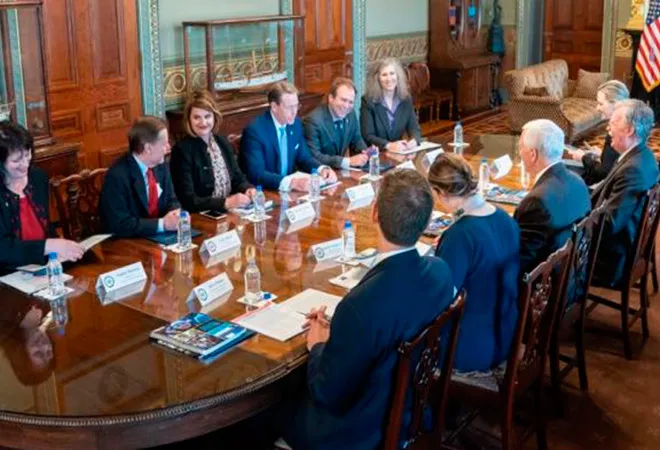
The Citizenship Amendment Act (CAA) has evoked extreme reactions from the international community. While the government has dealt with nationwide dissent with strong retaliatory measures, the move seems to have backfired, further widening the divide between the advocates and opposers of the bill. Notably, the reverberations of dissent have not just been felt within India. The global community too, seems to have taken stock of the mass anti-CAA protests across India and the perceived implications of the legislation on minority sentiments. With the enactment of the CAA coming on the heels of the decision to abrogate Article 370, the BJP’s strong Hindutva stance informing domestic policy decisions is influencing the foundational principle of religious pluralism that underscored many of India’s key strategic alliances. The global responses have ranged from open condemnation to tactful neutrality depending on the nature of the alliance and the extent to which ‘shared values’ inform the same. Moreover, since Prime Minister Narendra Modi has previously demonstrated his interest in solidifying India’s ties with the likes of the United States, European Union and China, examining the ramifications of these legislations beyond the domestic outrage is pertinent.
The US’ criticism of India’s rightward shift clearly reflected in their response to the controversial CAA. The United States Commission on International Religious Freedom (USIRF) raised concerns over the proposed legislation even before it was endorsed by the Rajya Sabha. It conceived of the bill as using religion as a pathway to citizenship to be against the core tenet of “religious pluralism”. Describing the bill as a “dangerous turn in the wrong direction,'' the USIRF maintained that the bill undermined “the most democratic tenet”. It went on to demand sanctions against “Amit Shah and other principled leadership”.
In response to revocation of Article 370, two house resolutions (H. Res 724 and H. Res 745) were tabled by Rep. Rashida Tlaib and Rep. Pramila Jaypal respectively. Although these resolutions are not passed onto the Senate for a vote, the critical scrutiny of India’s domestic policy in the US Congress is likely to influence international opinion. Moreover, the house resolutions also went against a key tenet of bipartisanship in US foreign policy with respect to Kashmir, which has traditionally treated the Kashmir dispute as India’s internal matter. The house resolution (H. Res 724) criticised the Indian state for unilaterally changing “the status of the Kashmiri people without a direct consultation or consent of the Kashmiri people”. This perception of India’s actions in Kashmir coupled with decisions to curb dissent through internet shutdowns and putting political adversaries under house arrest further reinforced fears of a shift in how India seeks to establish control.
Thus, American skepticism regarding both legislations seem to be hinged on its perceived divergence from shared values of the alliance. Moreover, with Donald Trump being impeached by the house, the race to the 2020 US presidential election seems wide open. With key Democratic representatives like Adam Shiff and James Mcgovern openly condemning India’s actions, the US-India strategic alliance is likely to face headwinds.
In anticipation of Obama’s visit to India in 2010, an article on the expanding US-India strategic partnership and the core values underscoring it, had shed light on why certain sections of American policymakers fear the authoritarian turn India is taking with its domestic policy decisions. The article ascribed the strategic partnership to shared values of “democracy, individual liberty, rule of law, freedom of expression and practice of religion and protection to minorities.” Thus, demonstrating that strategic alliances between nations are not merely a product of converging utilitarian interests, it is often based on shared values and ethics.
The European Union (EU) on the other hand has preferred to adopt a relatively neutral stance. The official statement of the EU in response to Article 370 stressed on “the importance of steps to restore the rights and freedoms of the population in Kashmir”. EU’s stance was mirrored in response to the CAB legislation as well, wherein EU ambassador to India Ugo Astuto hoped that the bill is in accordance to the “high standards” of the Indian constitution. The rapidly evolving EU-India strategic alliance based on shared interest could explain this neutral stance. Previously deemed as a “loveless arranged marriage,” the EU-India alliance has strengthened in recent decades. The EU-India Summit in 2017 that cemented bilateral ties on sustainable urbanisation and climate change amounted to an investment of 800 million Euros in Indian solar projects. EU’s big stakes in India thus partially explain its hesitation to take an explicit stance of condemning the CAA and Indian actions in Kashmir.
The Organisation of Islamic Cooperation (OIC), meanwhile, declared that it was “increasingly concerned” by the CAA due to its apparent discrimination of Indian Muslims. The OIC has historically expressed a sympathetic view towards disenfranchised Muslims as demonstrated in their desire to exclude primarily Muslim groups in fighting for liberation against oppressive regimes from the definition of terrorism.
More surprising was the reaction of China, which preferred to issue a joint statement with Pakistan. The joint statement by India’s immediate neighbors opposed “any unilateral sanctions that complicated the situation”. India, often considered as a “natural balancer” to China’s growing influence, was particularly sensitive to Chinese dissatisfaction. Japan PM Shinzo Abe’s visit to India,too, was delayed citing increasingly violent protests in Assam. Whether the afore-mentioned instances of global acknowledgement of India’s domestic policy decisions would adversely affect key foreign policy issues and indeed foreign investments opportunities through programmes such as the ‘Make in India’ initiative, only time will tell. Nonetheless, it is clear that India is concerned about its global image and has taken various steps to counter the growing perception of it being an oppressive regime.
In response to murmurs of American sanctions against Amit Shah, India refuted USIRF’s concerns as “neither accurate nor warranted”. When Malaysian Prime Minister Mahathir bin Mohamad questioned the “necessity” of the CAA and lamented the “withering of secularism” in India, instead of a general rebuttal, India’s MEA went a step further and summoned the Charge D’ Affairs of the Malyasian embassy to express discontentment. Probably India’s most explicit manifestation of fearing international backlash for domestic policies was the unofficial visit of an informal delegation of the EU to the Kashmir Valley. At a time when domestic politicians were prohibited from visiting and taking stock of the scenario, the EU delegation's visit indeed raised eyebrows. Moreover, with 22 of the 27 EU delegates belonging to the far right, the motives behind their visit seemed to get tacit international validation, reinstating the importance India lays on its global image.
With protests against CAA gaining momentum across the world in locations like Boston, Chicago and Hague among others, India’s global image as the world’s largest liberal democracy is under the scanner. Whether strongly worded responses by the MEA and partisan International delegations supporting India’s stance work to improve that image is a mystery still evading clear consensus. Nonetheless, a realignment of domestic and international agendas seems to be imperative in order to prevent further maligning of a global image that took decades to solidify.
The views expressed above belong to the author(s). ORF research and analyses now available on Telegram! Click here to access our curated content — blogs, longforms and interviews.




 PREV
PREV


